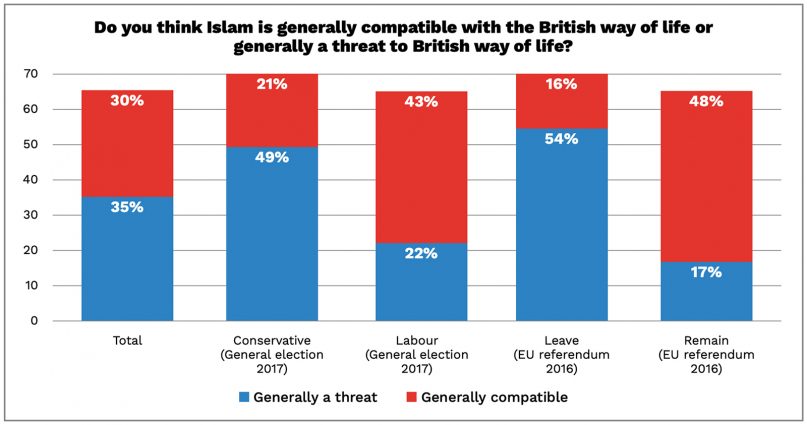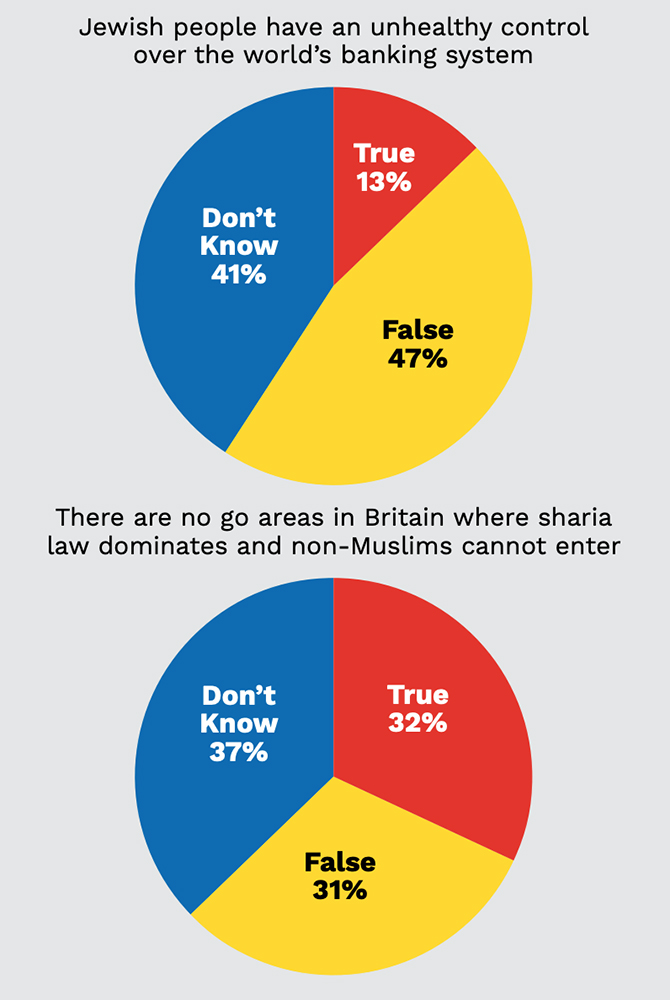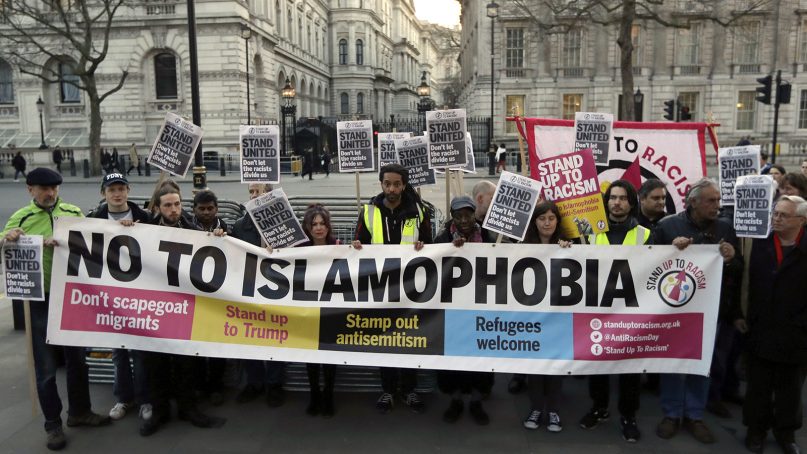(RNS) — A new report finds that about 35 percent of British people think that Islam is a threat to the British way of life in the wake of 2017 terrorist attacks and that anti-Semitism on the political left is an increasing issue in the U.K.
The anti-fascist group Hope Not Hate’s annual “The State of Hate” report, published Monday (Feb. 18), based on a survey of 10,383 Brits conducted in July last year, found that anti-Muslim prejudice has hardened in the past eight years and, among far-right groups, supplanted fears of increasing immigration.
Among Britons who voted for the center-right governing Conservative Party in 2017, nearly half — about 49 percent — agreed that Islam threatens British culture in the more recent study. About 22 percent of those who support Britain’s main opposition Labour Party agreed.

“Do you think Islam is generally compatible with the British way of life or generally a threat to British way of life?” Graphic courtesy of Hope Not Hate
“Unless the Conservatives have chosen to cynically abandon the Muslim vote in upcoming elections to solidify their hold on anti-Muslim supporters, they must stop signalling to voters they find Islamophobia acceptable within its ranks and visibly address the growing problem,” the report’s authors warned.
About 32 percent of English people also believe Britain has “no-go areas” where non-Muslims cannot enter and where Shariah law rules. Among Conservative voters, that number is 47 percent.
“It’s important to call out these false narratives of ‘no-go zones,'” said Todd Green, an expert on Islamophobia who visits the so-called zones as part of teaching his Luther College students about Islam in Europe. “It’s been debunked repeatedly by mainstream media reports and other law enforcement sources, but in far-right circles and in tabloid news articles, the narrative persists.”
Hope Not Hate’s survey found that attitudes toward Muslims in Britain had generally become more positive between 2011 and 2016, but a string of terror attacks in the U.K. in 2017 turned the tide.

Hope Not Hate noted that conspiracy theories gained traction in British society. Graphic courtesy of Hope Not Hate
A 2017 poll by the group showed that 42 percent of English people said their suspicions of Muslims in Britain had increased as a result of the recent terror attacks; a quarter said Islam is “a dangerous religion that incites violence,” and over half said Islam poses a serious threat to Western civilization.
“The 2017 terrorist attacks in Britain — the London Bridge attack, the Westminster attack, and the Manchester attack — reinforced the dominant narrative that Islam is prone to violence and therefore Muslims are a suspect population who represent a threat to the British way of life,” Green explained.
British Muslims told Religion News Service they found the new report to be “worrying.”
“As Muslims we are taught from a very young age to show loyalty to the nation we live in and to be pragmatic and contributing members of society,” said Imam Mansoor Clarke, who lives in London. “As a young British Caucasian imam myself I see being British and being Muslim as two integral parts of my identity where one complements the other.”
The group also found a continued increase in traffic to far-right websites and followers of far-right social media accounts spreading hate and misinformation.
The report also pinpointed left-wing anti-Semitism, particularly in the Labour Party, as a critical problem. The authors cited conspiracy theories and tropes about undue levels of Jewish power, even subconscious ones, as well as dismissing allegations of liberal anti-Semitism as a right-wing or Zionist plot. The report points to an increase in anti-Semitic Google searches.
Thirteen percent of the country agreed that Jewish people have an unhealthy control over the world’s banking system. Almost half of people surveyed said it was a false statement, and about 41 percent said they did not know.
British Jews have accused Labour party leader Jeremy Corbyn, a frequent critic of Israel, of anti-Semitism several times since he became leader of his party, and last year seven elected Labour representatives were suspended or resigned over anti-Semitic comments. Just today, seven more Labour lawmakers announced that they were leaving the party over what one member called an “institutionally antisemitic” culture.
Hope Not Hate’s report also predicted a rise in support for Islamist extremist group Al-Muhajiroun after its leader, the controversial preacher Anjem Choudary, was released from prison in 2018. The influential radical was jailed for pledging allegiance to the Islamic State terrorist group and urging others to support it.
The group has been linked to about half of British terror attacks in the past two decades. Among the group’s supporters are those responsible for the 7/7 London bombings, the 2017 Westminster Bridge and London Bridge attacks.
“The stats show that a substantive number of people think that Islam and British Muslims are some form of threat,” noted Iman Atta, director of the Tell MAMA project to document anti-Muslim incidents in the U.K. “The reality is that Islamist extremists, who are the problem, threaten us all, Muslims and non-Muslims, and it is our collective duty to stand firm and counter them.”





